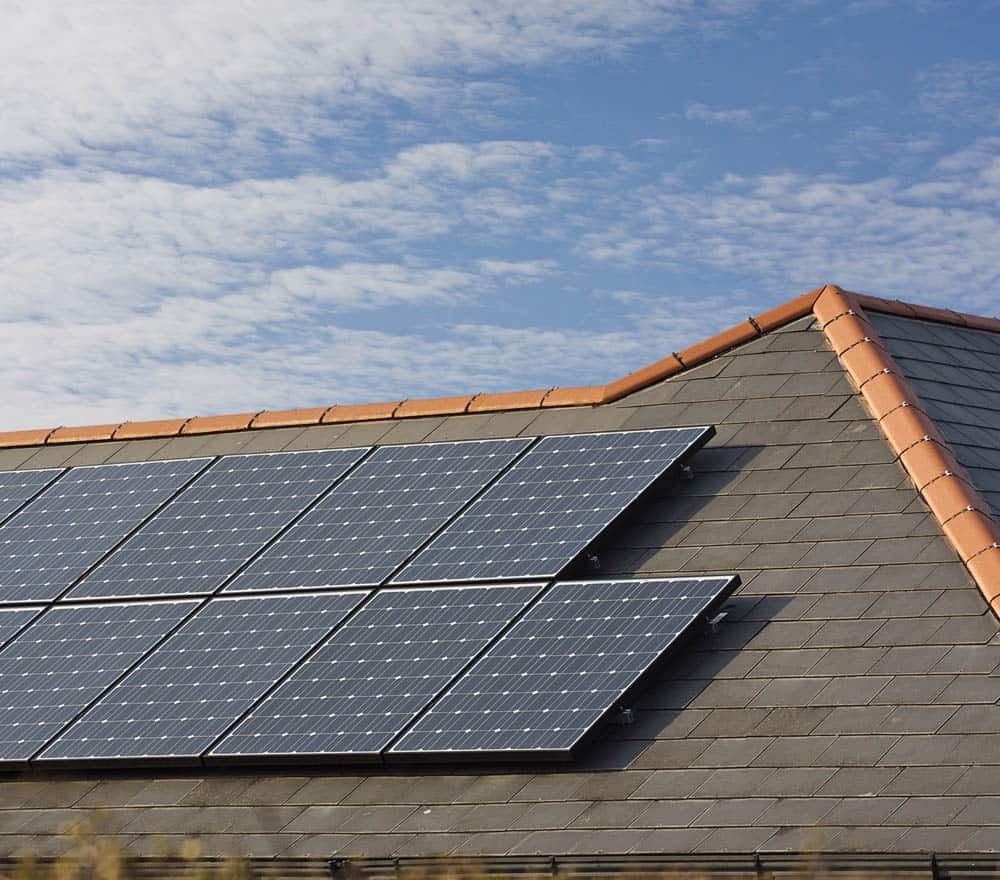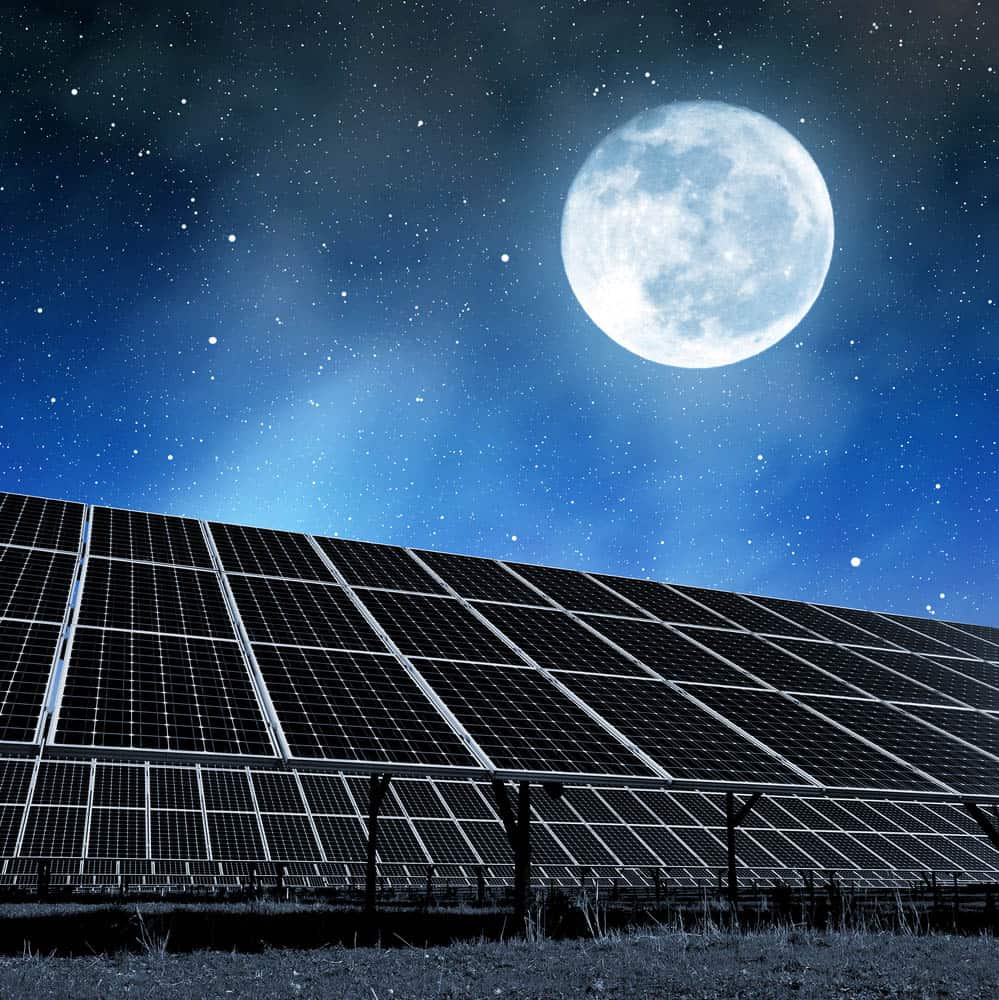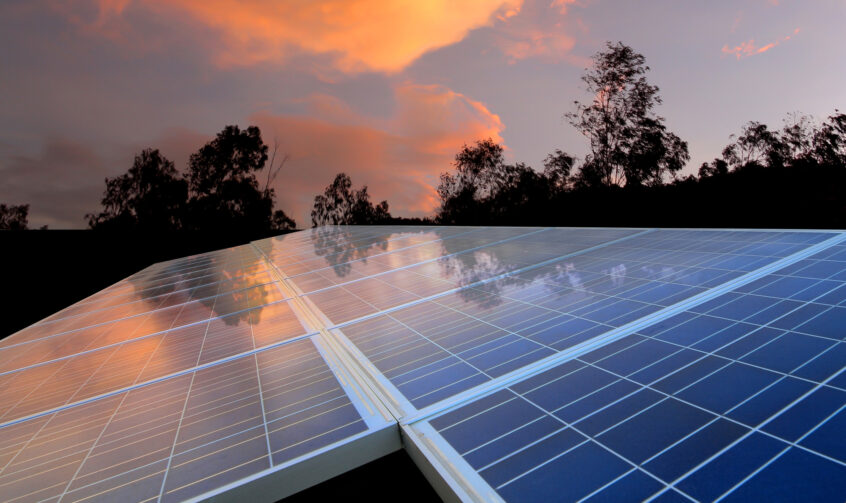The Pew Research Center reports that, in the last year, at least 46% of American homeowners have considered adding solar panels to their home.
Perhaps you’re among them. You’re drawn to solar panels by the potential to save money and reduce your environmental impact. At the same time, you have questions.
You’re just beginning to understand solar technology, but you know that solar panels rely on sunlight. So what happens when the sun isn’t shining? Do solar panels work at night? What about on cloudy days? Will you be left in the dark?
Find answers to these questions and more below.
How Do Solar Panels Work?
Solar panels work by capturing the sun’s energy in smaller units called photovoltaic cells. The word “photovoltaic” describes the function of these cells; they convert sunlight into electrical energy.
Basically, each photovoltaic cell is an electrically charged “sandwich.” This sandwich includes two layers of a semiconducting material, like silicon. After it’s treated with phosphorous, the top layer of silicon takes on a negative charge. Meanwhile, the bottom layer is treated with boron to achieve a positive charge. These opposite charges produce an electrical field where the two layers meet.
When photons, or light particles from the sun, shine on this “sandwich,” they knock negatively charged electrons free. The electrical field pushes these loose electrons out of the sandwich. When they reach the sides of the panels, metal conductive plates transfer them to wires. Once it reaches these wires, solar-generated electricity works like any other power source.
Do Solar Panels Require Ideal Conditions?

With this basic understanding, it might be logical to assume that certain conditions are ideal for solar panels. You might assume, for example, that solar panels won’t work if your property is shaded. You might also assume that solar panels won’t work on cloudy or even cooler days. You may also be wondering if solar panels work at night?
Yet each of these assumptions is mistaken. The only condition necessary for solar panels to work is natural daylight, which contains the photons necessary to generate solar energy.
This means that solar panels need sunlight to work, but they don’t need direct sunlight. Solar panels that receive direct sunlight will produce more power. However, panels will continue to generate electricity even in the shade and even on cloudy days.
Solar panels also operate even in cooler temperatures. In fact, a cool sunny day can generate just as much energy as a warm sunny day.
How Effective Are Solar Panels in Less-Than-Ideal Conditions?
Solar panels work in the absence of direct sunlight, but they don’t produce as much energy. So how much energy will they produce? And will it be enough energy to keep your lights on and your appliances running?
On a cloudy day, you can expect solar panels to produce between 10 and 25% of their usual output. What if this isn’t enough to power your home? Will you be left in the dark?
Rest assured, you won’t find yourself in the dark if you choose to install solar panels.
First, as a resident of the Albuquerque area, you actually do enjoy rather ideal conditions for solar energy. Sunny days — 300 of them a year, in fact—are the norm in Albuquerque. What’s more, the average sunny day in Albuquerque includes between 6.4 and 8.8 peak sun-hours. This is well in excess of the minimum four peak sun-hours necessary for effective solar energy production.
Second, when an unusually cloudy day strikes, two solutions will keep your lights on and your appliances humming. These are net metering and solar battery storage.
These same solutions, in fact, will keep your energy supply steady. But the real question is, do solar panels work at night?
Do Solar Panels Work At Night?

The simple answer to this question is no. Solar panels can generate some new energy on cloudy days, but they don’t generate new energy at night. The night sky simply does not contain the photons necessary for photovoltaic cells to work.
Again, though, net metering and solar battery storage will keep your power flowing. Furthermore, both net metering and solar battery storage rely on the work your solar panels did during the day.
Powering Your Home with Solar Panels On Cloudy Days and At Night
During the day and especially on sunny days, your solar panels enjoy ideal conditions. Under these conditions, they are likely to produce more energy than your home needs. So what happens to the excess energy? Is there any way you can keep it for later use? Actually, there is.
Net metering and solar battery storage are two ways that you can tap into the excess energy your solar panels generate during particularly sunny days. This will also help keep your power running and ensure that your solar panels work at night, although they technically aren’t creating new power.
Net Metering
Net metering, or net energy metering, involves establishing a kind of “savings account” or incentive arrangement with your local power company. On days when your panels produce excess energy, you can deposit the leftovers into the grid. In return, the power company will credit your bill.
When your panels don’t generate enough energy—at night or on cloudy days, for example, you can draw on these credits. In many cases, these credits will cover the cost of the energy you need to pull from the grid.
Still, using net metering to power your home requires some advance planning. To deposit excess energy and receive reimbursement for it, you’ll need to connect your solar power system to the electric grid. A qualified solar installer can help you with this process.
Before you count on net metering, though, it’s also necessary to contact your local power company. Not all companies offer net metering. Some of those that do may also charge you more when you seek to “withdraw” and use the energy you previously deposited in the grid.
These policies aim to keep local power companies in control of the energy market. However, they can also make net metering much less cost-effective for homeowners.
Fortunately, net metering is not your only option.
Solar Battery Storage
Another option that lets you keep excess solar energy for later use is solar battery storage. If you’re seeking energy independence, a solar battery is actually the ideal option.
If your solar power system includes battery storage, you won’t need to send excess energy to the grid and then rely on the power company’s self-interested reimbursement policies. Rather, you’ll be able to store excess solar energy yourself for use on your terms.
During the day, energy from your panels will fill your solar battery. At night or on cloudy days, you’ll be able to draw on this stored energy before turning to the electric grid. You’ll be able to do so, moreover, without any added cost.
Another benefit of solar battery storage is reliability. The traditional electricity grid is subject to power outages caused by an aging infrastructure and severe weather events. These outages cost the U.S. economy billions of dollars. They also cause significant inconvenience and even life-threatening situations.
Unfortunately, research shows that power outages have increased—and, in some estimates, even doubled—over the last decade. Experts suggest that these numbers are likely to increase further as Americans’ energy demands continue to increase.
By installing solar panels, especially those that include solar battery storage, you’re reducing overall demand on an aging electric grid. You’re also protecting your family from these costly outages. This means you’re keeping your power supply steady during the day, at night, and anytime in between.
Will Solar Panels Ever Work At Night?
You’ve found favorable answers to your other questions about solar panels, so you’ve decided to press your luck with a final and seemingly “crazy” question. Will solar panels work at night and be able to produce new energy in the dark?
Perhaps surprisingly, this question isn’t as crazy as you might think.
Currently, scientists at UC Davis are working on a photovoltaic cell that can produce up to 50 watts of power each night. This amount equals about a quarter of the average solar panel’s daytime output. It also puts these so-called “anti-solar” cells on par with a traditional solar panel’s output on a cloudy day.
According to researchers, anti-solar cells essentially reverse the process used to generate power in a traditional solar cell. A regular solar panel absorbs sunlight. In contrast, anti-solar cells, which are warmer than the cold night sky, emit light.
The resulting electrical current flows in the opposite direction, and these cells require different materials. However, they produce power nonetheless. Thus, their potential to increase energy efficiency and reliance on renewable power sources is promising.
What Is the Future Outlook for Solar Energy Production?
Efforts to develop anti-solar cells that work at night are exciting, and these efforts are ongoing. For the foreseeable future, though, traditional solar cells remain the option of choice for energy-conscious consumers, and efforts to improve solar technology continue apace. These efforts aim to increase the energy efficiency and reduce the cost of traditional solar panels.
One possibility uses electronic tracking hardware to keep solar panels positioned toward the sun. Optimizing the position of the panels, in turn, maximizes the amount of light they can absorb.
Another possibility seeks to improve efficiency by adding more layers to the solar cell “sandwich.”
Meanwhile, efforts continue to develop thinner—and therefore less expensive—solar cells.
The best solar panel companies, like SunState Solar, are knowledgeable about the latest technological developments. They also incorporate these developments into their products and services. In this way, they pass the benefits and savings on to you, the consumer. We also help our customers know the answers to important questions, like the ever popular question: do solar panels work at night?
The Benefits of Solar Power Shine On—Today, Tonight, and In the Future
Solar panels harness the sun’s energy to power homes and businesses across the United States and around the world. In doing so, they produce cost savings and promote a healthier environment. They also offer protection from the increasingly unreliable traditional electric grid.
Schedule a free consultation with SunState Solar to start exploring the benefits solar panels can bring to your home.

